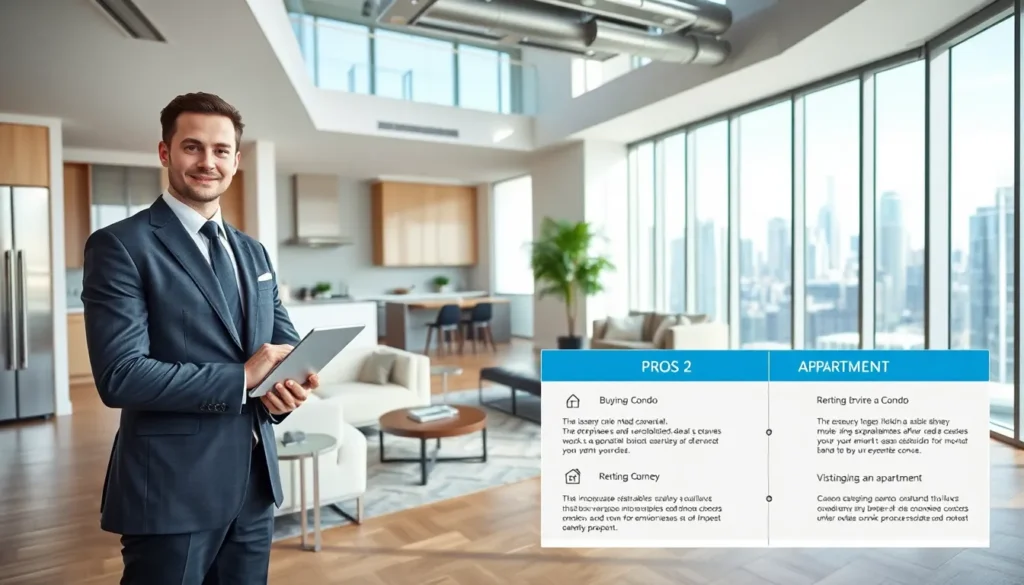Table of Contents
ToggleWhen it comes to finding a place to call home, the age-old debate of renting versus buying can feel like choosing between pizza and tacos—both have their perks, but which one satisfies your cravings? For many, this decision isn’t just about lifestyle; it’s a financial puzzle that can leave even the best of us scratching our heads.
Overview of Renting vs Buying
Renting a home often provides flexibility that buying cannot match. Monthly rent payments commonly include maintenance costs, making budgeting more predictable. Homeownership typically requires larger initial investments, including a down payment and closing costs. Owning a property allows for equity buildup over time, potentially leading to significant financial returns.
Renters may also enjoy lower upfront costs while avoiding interest payments. Property taxes and homeowners insurance can increase ownership costs significantly. In contrast, buyers have the advantage of making modifications without landlord approval. Selling a property can yield profits, but market conditions can affect selling times and prices.
Renting usually offers convenience for those who may relocate frequently for work or personal reasons. Maintenance responsibilities fall on landlords, relieving tenants of additional burdens. Buying often involves long-term commitments, with many homeowners staying for years.
Renters often deal with short-term leases, which can be renewed or terminated more easily. The way property values fluctuate affects overall investment benefits for homeowners. When analyzing long-term financial implications, renters may find it easier to move without heavy losses. Conversely, the stability of staying in one place can appeal to buyers.
Ultimately, each option has unique advantages and disadvantages. Personal circumstances and financial situations heavily influence the decision to rent or buy. Understanding these factors can clarify which path aligns with individual needs.
Key Differences in Financial Considerations

Financial considerations play a crucial role in the decision to rent or buy a home. Understanding these differences can guide individuals in making informed choices based on their circumstances.
Initial Costs
Renting typically involves lower initial costs compared to buying. Renters often pay a security deposit and the first month’s rent, amounting to around one to three months’ worth of costs. In contrast, homebuyers face higher upfront expenses, including down payments that usually range between 3% and 20% of the property’s price. Additional costs for buyers include closing fees, inspections, and appraisal fees. These initial financial outlays can significantly affect budget constraints, making renting a more accessible option for many people.
Long-Term Financial Implications
Homeownership generally leads to financial growth over time. Owners build equity as property values appreciate and mortgage payments decrease the principal balance. Renters, however, do not benefit from equity; monthly payments remain rental expenses with no return on investment. Market fluctuations impact homeowners and may lead to potential profits upon selling, whereas renters face no risk of property depreciation. Understanding these long-term implications influences financial planning and ultimately affects decisions to rent or buy.
Lifestyle Considerations
Deciding between renting and buying influences lifestyle choices and overall satisfaction. Factors such as flexibility, mobility, and maintenance play crucial roles in this decision.
Flexibility and Mobility
Renting offers greater flexibility in lifestyle choices. Individuals can relocate quickly, accommodating job changes or personal preferences without the pressure of selling a home. Life circumstances shift, and renters easily adapt to new environments. Leases often last 12 months, allowing for periodic reassessment of living situations. In contrast, homeowners face longer commitment durations, typically spanning multiple years. The effort involved in selling a property can delay relocation. Those valuing freedom and mobility might prioritize renting.
Maintenance Responsibilities
Maintenance responsibilities differ significantly between renting and buying. Renters typically enjoy maintenance-free living, as property owners handle repairs and regular upkeep. This arrangement eases the stress of unexpected issues like plumbing failures or roof leaks. Financial implications also favor renting, given that maintenance costs are often included in monthly payments. Homeownership requires significant time and financial investment for repairs. Homeowners need to budget for maintenance and improvements, making it essential to account for these responsibilities when evaluating lifestyle preferences.
Pros and Cons of Renting
Renting offers various benefits, appealing to many individuals and families.
Advantages of Renting
Renting provides flexibility. Tenants can easily relocate without the burden of selling a home. Monthly payments often include maintenance costs, simplifying budgeting. Lower upfront costs make renting accessible for those without significant savings. No responsibility for repairs falls on renters, freeing them from unexpected expenditures. Additionally, renting allows for quick adjustments to living situations in response to job changes or personal preferences.
Disadvantages of Renting
Renters lack equity. Monthly payments do not contribute to ownership, leading to potential long-term financial drawbacks. Stability may also be an issue, as lease terms can change or rental prices may increase unexpectedly. Limited ability to customize living spaces restricts personal expression. Furthermore, renters usually face restrictions on pets or modifications, which can limit lifestyle choices. The lack of investment and potential for profit during sale contrasts sharply with the advantages homeowners enjoy.
Pros and Cons of Buying
Buying a home presents distinct advantages and disadvantages that require careful consideration.
Advantages of Buying
Equity buildup occurs with each mortgage payment made, enhancing long-term financial investment. Homeownership provides stability and security, allowing individuals to avoid the uncertainties of changing rental markets. Freedom to personalize living spaces is another significant benefit; homeowners can remodel and decorate as desired. Tax deductions related to mortgage interest further improve financial benefits, making homeownership appealing. Potential appreciation of property value also adds to the allure, as homeowners may profit when selling. Additionally, owning a home fosters community ties and a sense of belonging, enhancing overall life satisfaction.
Disadvantages of Buying
High upfront costs present a notable drawback, including down payments and closing expenses that can exceed thousands of dollars. Ongoing maintenance responsibilities pose another challenge; homeowners must budget for repairs and improvements that renters typically avoid. Market fluctuations impact property values, which could lead to financial losses if sold during a downturn. Commitment to a long-term residence limits mobility, making relocation difficult. Finally, homeowners face property taxes and insurance costs that can increase over time, affecting overall affordability.
Renting vs Buying Comparison Chart
| Aspect | Renting | Buying |
|---|---|---|
| Initial Costs | Lower upfront costs, including a security deposit and first month’s rent. | Higher upfront expenses, such as down payments and closing costs. |
| Monthly Payments | Predictable payments generally including maintenance costs. | Payments towards the mortgage plus property taxes and insurance. |
| Equity | Renters do not build equity; monthly payments do not lead to ownership. | Homeowners build equity as property values appreciate over time. |
| Maintenance | Maintenance responsibilities fall on landlords, relieving renters of this burden. | Homeowners handle maintenance, often leading to ongoing costs for repairs and improvements. |
| Flexibility | Renting allows quick relocation in response to job changes or personal needs. | Homeownership commits individuals to a longer-term residency, reducing mobility. |
| Market Risk | Renters face limited financial risk linked to property value fluctuations. | Homeowners face market uncertainties that can impact property values and investment. |
| Personalization | Restrictions typically limit renters from customizing their living spaces. | Homeowners have the freedom to modify their homes and landscapes. |
| Tax Benefits | Renters do not receive any tax deductions for rent payments. | Homeowners benefit from mortgage interest deductions and potential tax advantages. |
Renting and buying present distinct financial implications and lifestyle choices. Potential owners should assess their readiness for higher costs and commitments, while renters may appreciate the flexibility and lower initial financial barriers. Each option serves different needs and goals, making informed analysis essential.
Deciding between renting and buying a home requires careful consideration of personal and financial factors. Each option presents unique benefits and challenges that can significantly impact one’s lifestyle and financial future.
Renting offers flexibility and lower upfront costs, making it ideal for those who prioritize mobility. Conversely, buying a home can lead to equity growth and stability but demands a larger financial commitment.
Ultimately, individuals should evaluate their circumstances and long-term goals. By analyzing the pros and cons of each choice, they can make informed decisions that align with their needs and aspirations.




